Business Ethics: Exploring Perspectives on Ethical Leadership
VerifiedAdded on 2022/08/25
|6
|1136
|21
Report
AI Summary
This report delves into the multifaceted realm of business ethics, exploring diverse perspectives on ethical leadership through the lens of various individuals and their experiences. It examines the viewpoints of Deshi Chen, Mei Hue Felung, Mike Gusstavsson, and Jan Edwards, each with their unique stances on ethical practices in the business world. The report also incorporates a reflective analysis of ethical leadership, drawing upon consequentialist (teleological) ethics and its implications in decision-making processes. Furthermore, it touches upon relevant ethical theories, such as deontological ethics, and frameworks like the moral intensity framework, providing a comprehensive understanding of the challenges and considerations involved in navigating ethical dilemmas within a business context. The report is supported by a bibliography of relevant academic sources, providing a strong foundation for the analysis.
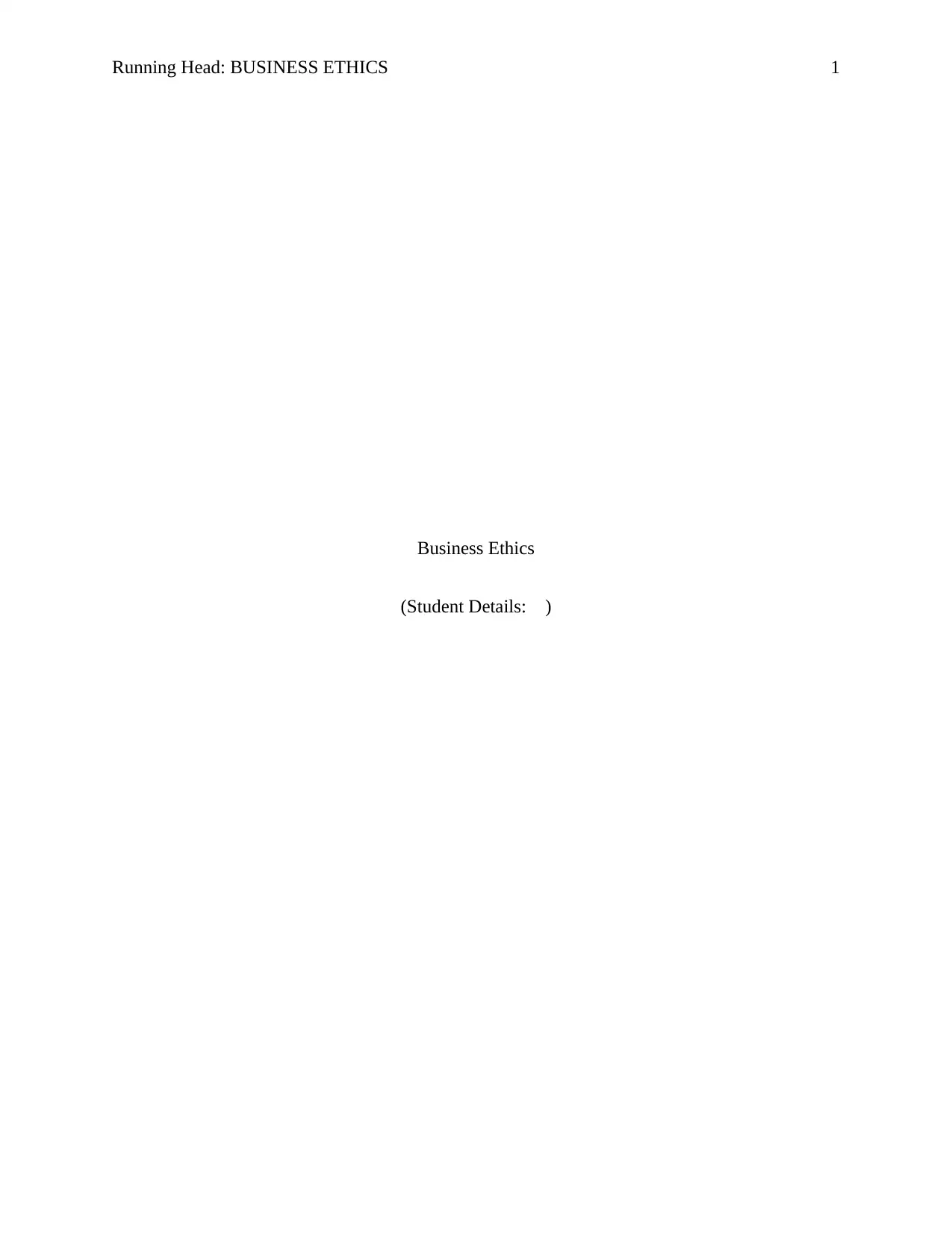
Running Head: BUSINESS ETHICS 1
Business Ethics
(Student Details: )
Business Ethics
(Student Details: )
Paraphrase This Document
Need a fresh take? Get an instant paraphrase of this document with our AI Paraphraser
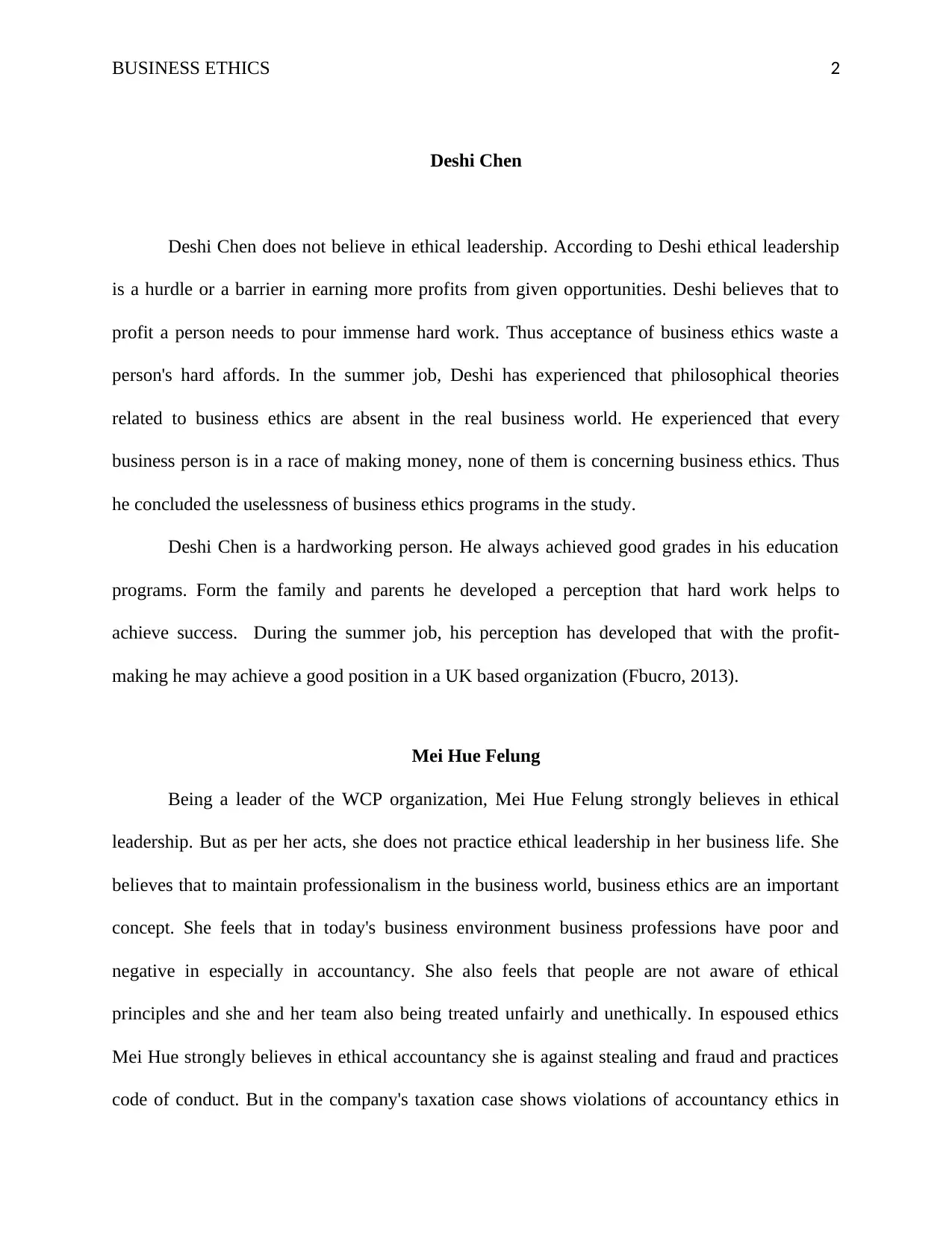
BUSINESS ETHICS 2
Deshi Chen
Deshi Chen does not believe in ethical leadership. According to Deshi ethical leadership
is a hurdle or a barrier in earning more profits from given opportunities. Deshi believes that to
profit a person needs to pour immense hard work. Thus acceptance of business ethics waste a
person's hard affords. In the summer job, Deshi has experienced that philosophical theories
related to business ethics are absent in the real business world. He experienced that every
business person is in a race of making money, none of them is concerning business ethics. Thus
he concluded the uselessness of business ethics programs in the study.
Deshi Chen is a hardworking person. He always achieved good grades in his education
programs. Form the family and parents he developed a perception that hard work helps to
achieve success. During the summer job, his perception has developed that with the profit-
making he may achieve a good position in a UK based organization (Fbucro, 2013).
Mei Hue Felung
Being a leader of the WCP organization, Mei Hue Felung strongly believes in ethical
leadership. But as per her acts, she does not practice ethical leadership in her business life. She
believes that to maintain professionalism in the business world, business ethics are an important
concept. She feels that in today's business environment business professions have poor and
negative in especially in accountancy. She also feels that people are not aware of ethical
principles and she and her team also being treated unfairly and unethically. In espoused ethics
Mei Hue strongly believes in ethical accountancy she is against stealing and fraud and practices
code of conduct. But in the company's taxation case shows violations of accountancy ethics in
Deshi Chen
Deshi Chen does not believe in ethical leadership. According to Deshi ethical leadership
is a hurdle or a barrier in earning more profits from given opportunities. Deshi believes that to
profit a person needs to pour immense hard work. Thus acceptance of business ethics waste a
person's hard affords. In the summer job, Deshi has experienced that philosophical theories
related to business ethics are absent in the real business world. He experienced that every
business person is in a race of making money, none of them is concerning business ethics. Thus
he concluded the uselessness of business ethics programs in the study.
Deshi Chen is a hardworking person. He always achieved good grades in his education
programs. Form the family and parents he developed a perception that hard work helps to
achieve success. During the summer job, his perception has developed that with the profit-
making he may achieve a good position in a UK based organization (Fbucro, 2013).
Mei Hue Felung
Being a leader of the WCP organization, Mei Hue Felung strongly believes in ethical
leadership. But as per her acts, she does not practice ethical leadership in her business life. She
believes that to maintain professionalism in the business world, business ethics are an important
concept. She feels that in today's business environment business professions have poor and
negative in especially in accountancy. She also feels that people are not aware of ethical
principles and she and her team also being treated unfairly and unethically. In espoused ethics
Mei Hue strongly believes in ethical accountancy she is against stealing and fraud and practices
code of conduct. But in the company's taxation case shows violations of accountancy ethics in
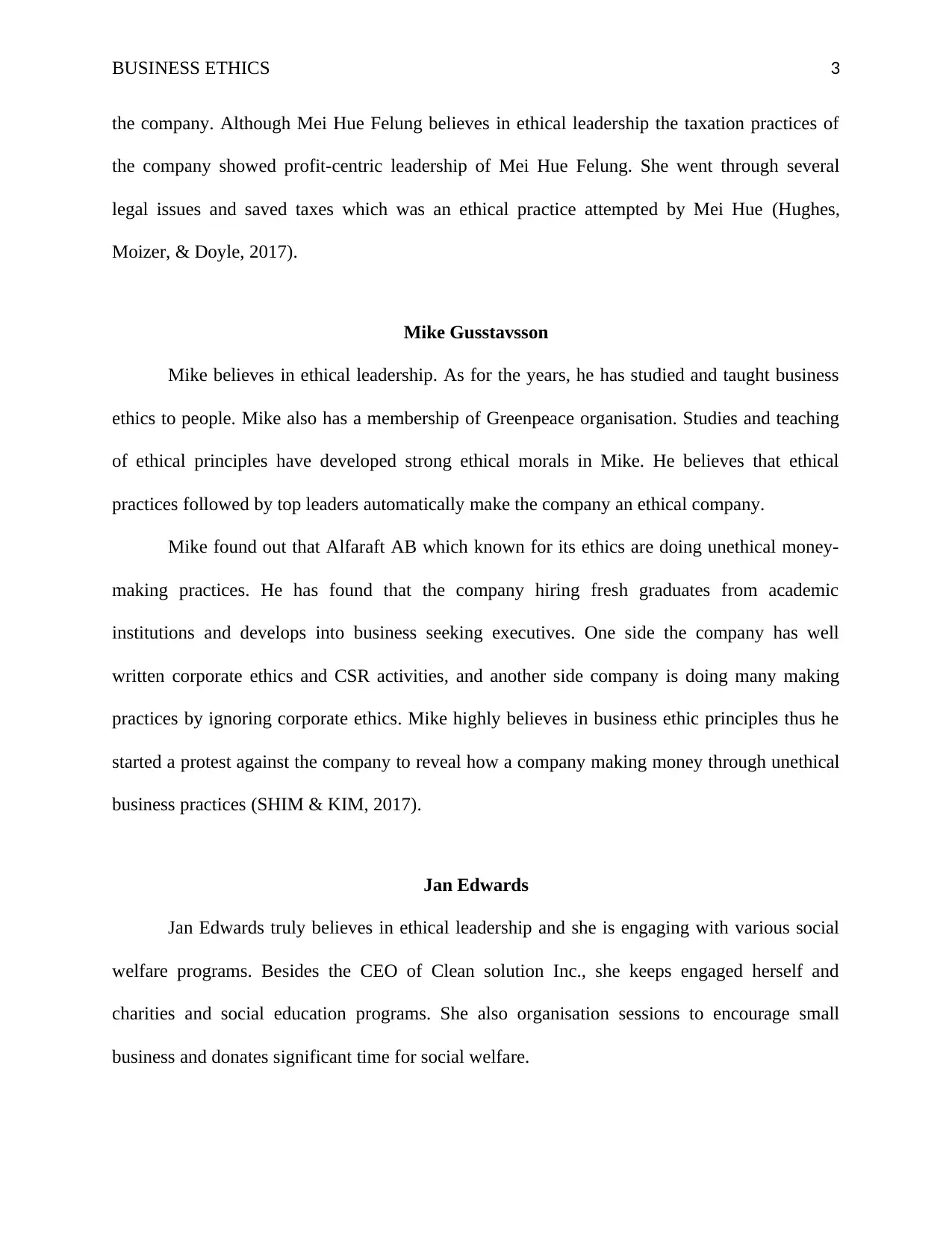
BUSINESS ETHICS 3
the company. Although Mei Hue Felung believes in ethical leadership the taxation practices of
the company showed profit-centric leadership of Mei Hue Felung. She went through several
legal issues and saved taxes which was an ethical practice attempted by Mei Hue (Hughes,
Moizer, & Doyle, 2017).
Mike Gusstavsson
Mike believes in ethical leadership. As for the years, he has studied and taught business
ethics to people. Mike also has a membership of Greenpeace organisation. Studies and teaching
of ethical principles have developed strong ethical morals in Mike. He believes that ethical
practices followed by top leaders automatically make the company an ethical company.
Mike found out that Alfaraft AB which known for its ethics are doing unethical money-
making practices. He has found that the company hiring fresh graduates from academic
institutions and develops into business seeking executives. One side the company has well
written corporate ethics and CSR activities, and another side company is doing many making
practices by ignoring corporate ethics. Mike highly believes in business ethic principles thus he
started a protest against the company to reveal how a company making money through unethical
business practices (SHIM & KIM, 2017).
Jan Edwards
Jan Edwards truly believes in ethical leadership and she is engaging with various social
welfare programs. Besides the CEO of Clean solution Inc., she keeps engaged herself and
charities and social education programs. She also organisation sessions to encourage small
business and donates significant time for social welfare.
the company. Although Mei Hue Felung believes in ethical leadership the taxation practices of
the company showed profit-centric leadership of Mei Hue Felung. She went through several
legal issues and saved taxes which was an ethical practice attempted by Mei Hue (Hughes,
Moizer, & Doyle, 2017).
Mike Gusstavsson
Mike believes in ethical leadership. As for the years, he has studied and taught business
ethics to people. Mike also has a membership of Greenpeace organisation. Studies and teaching
of ethical principles have developed strong ethical morals in Mike. He believes that ethical
practices followed by top leaders automatically make the company an ethical company.
Mike found out that Alfaraft AB which known for its ethics are doing unethical money-
making practices. He has found that the company hiring fresh graduates from academic
institutions and develops into business seeking executives. One side the company has well
written corporate ethics and CSR activities, and another side company is doing many making
practices by ignoring corporate ethics. Mike highly believes in business ethic principles thus he
started a protest against the company to reveal how a company making money through unethical
business practices (SHIM & KIM, 2017).
Jan Edwards
Jan Edwards truly believes in ethical leadership and she is engaging with various social
welfare programs. Besides the CEO of Clean solution Inc., she keeps engaged herself and
charities and social education programs. She also organisation sessions to encourage small
business and donates significant time for social welfare.
⊘ This is a preview!⊘
Do you want full access?
Subscribe today to unlock all pages.

Trusted by 1+ million students worldwide
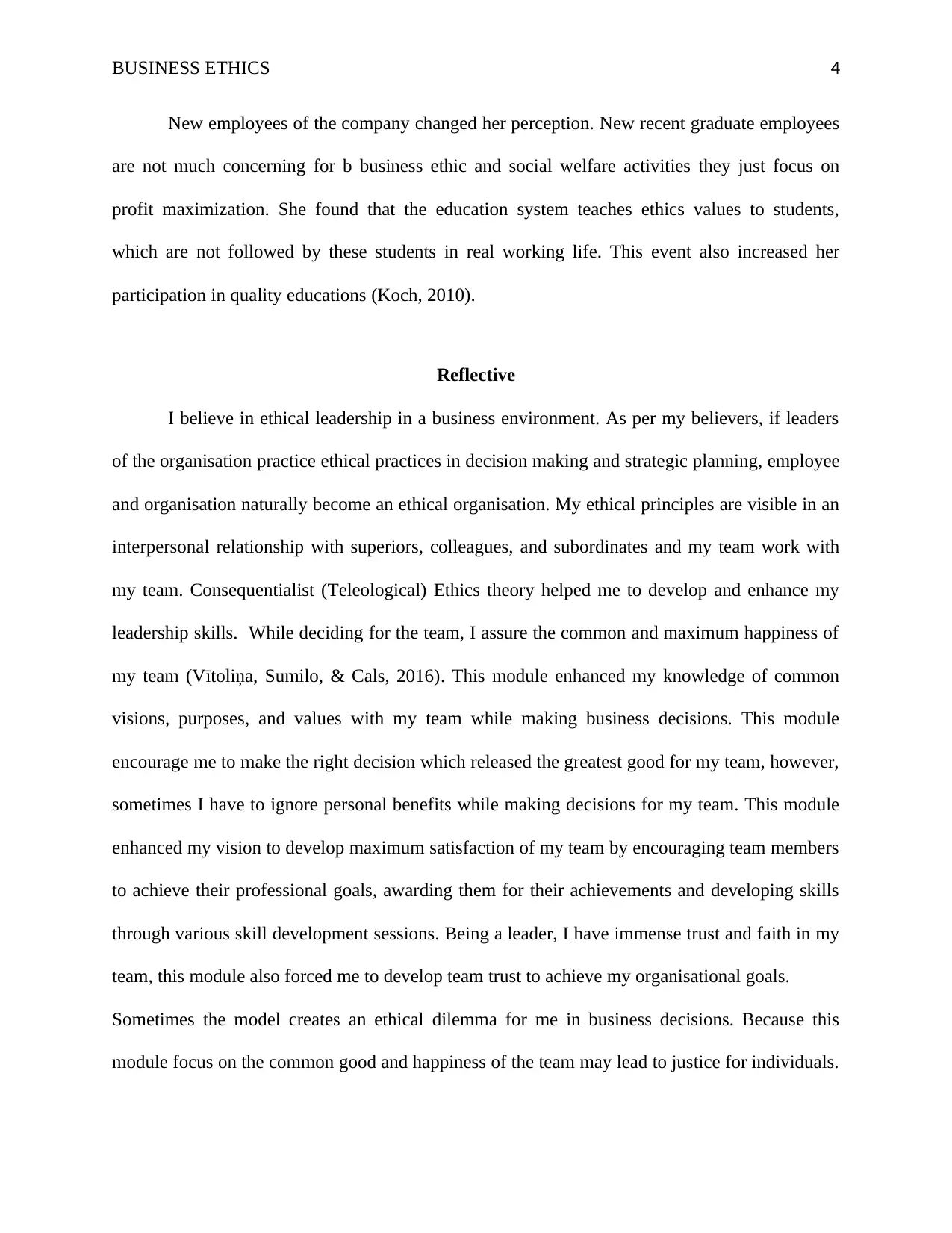
BUSINESS ETHICS 4
New employees of the company changed her perception. New recent graduate employees
are not much concerning for b business ethic and social welfare activities they just focus on
profit maximization. She found that the education system teaches ethics values to students,
which are not followed by these students in real working life. This event also increased her
participation in quality educations (Koch, 2010).
Reflective
I believe in ethical leadership in a business environment. As per my believers, if leaders
of the organisation practice ethical practices in decision making and strategic planning, employee
and organisation naturally become an ethical organisation. My ethical principles are visible in an
interpersonal relationship with superiors, colleagues, and subordinates and my team work with
my team. Consequentialist (Teleological) Ethics theory helped me to develop and enhance my
leadership skills. While deciding for the team, I assure the common and maximum happiness of
my team (Vītoliņa, Sumilo, & Cals, 2016). This module enhanced my knowledge of common
visions, purposes, and values with my team while making business decisions. This module
encourage me to make the right decision which released the greatest good for my team, however,
sometimes I have to ignore personal benefits while making decisions for my team. This module
enhanced my vision to develop maximum satisfaction of my team by encouraging team members
to achieve their professional goals, awarding them for their achievements and developing skills
through various skill development sessions. Being a leader, I have immense trust and faith in my
team, this module also forced me to develop team trust to achieve my organisational goals.
Sometimes the model creates an ethical dilemma for me in business decisions. Because this
module focus on the common good and happiness of the team may lead to justice for individuals.
New employees of the company changed her perception. New recent graduate employees
are not much concerning for b business ethic and social welfare activities they just focus on
profit maximization. She found that the education system teaches ethics values to students,
which are not followed by these students in real working life. This event also increased her
participation in quality educations (Koch, 2010).
Reflective
I believe in ethical leadership in a business environment. As per my believers, if leaders
of the organisation practice ethical practices in decision making and strategic planning, employee
and organisation naturally become an ethical organisation. My ethical principles are visible in an
interpersonal relationship with superiors, colleagues, and subordinates and my team work with
my team. Consequentialist (Teleological) Ethics theory helped me to develop and enhance my
leadership skills. While deciding for the team, I assure the common and maximum happiness of
my team (Vītoliņa, Sumilo, & Cals, 2016). This module enhanced my knowledge of common
visions, purposes, and values with my team while making business decisions. This module
encourage me to make the right decision which released the greatest good for my team, however,
sometimes I have to ignore personal benefits while making decisions for my team. This module
enhanced my vision to develop maximum satisfaction of my team by encouraging team members
to achieve their professional goals, awarding them for their achievements and developing skills
through various skill development sessions. Being a leader, I have immense trust and faith in my
team, this module also forced me to develop team trust to achieve my organisational goals.
Sometimes the model creates an ethical dilemma for me in business decisions. Because this
module focus on the common good and happiness of the team may lead to justice for individuals.
Paraphrase This Document
Need a fresh take? Get an instant paraphrase of this document with our AI Paraphraser
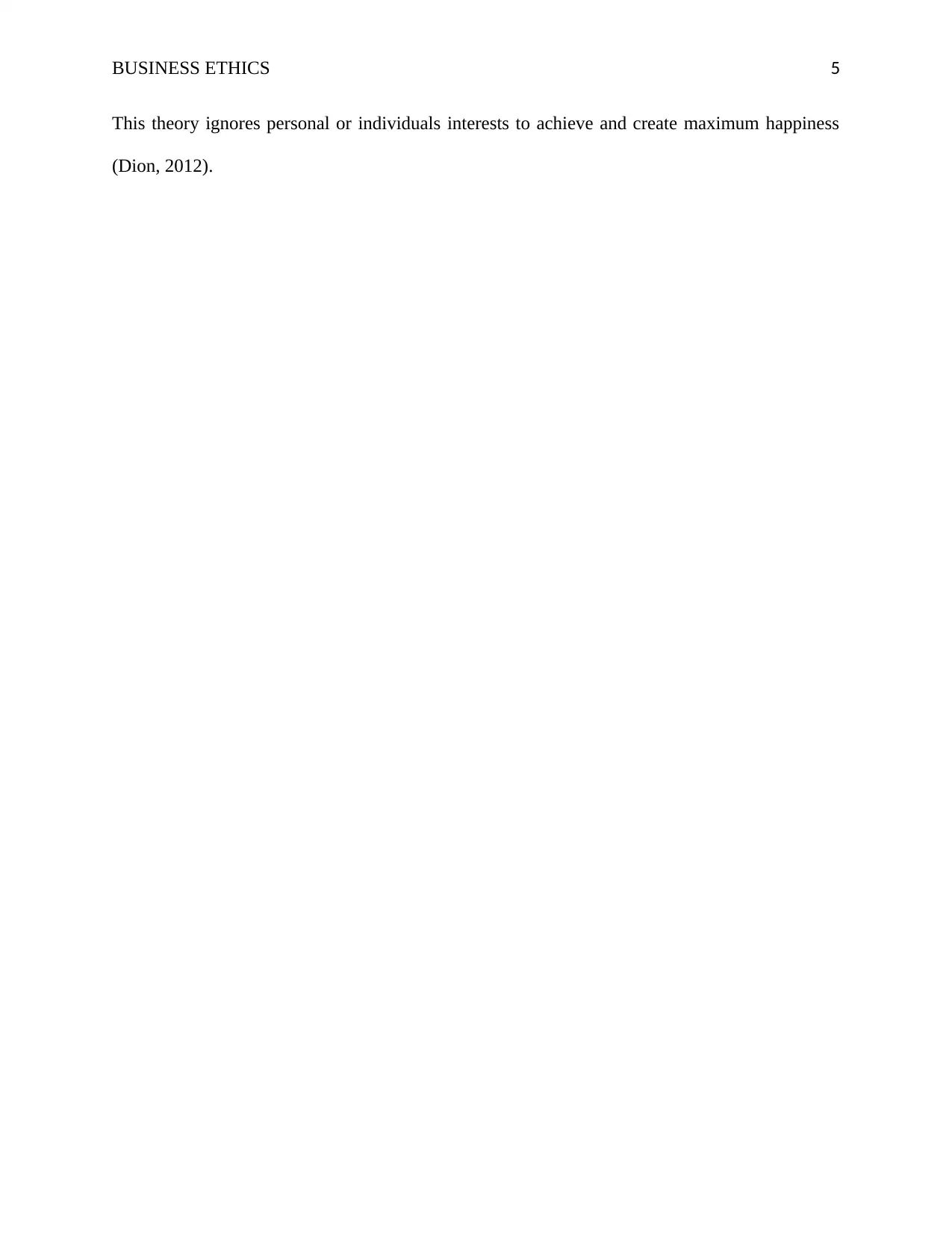
BUSINESS ETHICS 5
This theory ignores personal or individuals interests to achieve and create maximum happiness
(Dion, 2012).
This theory ignores personal or individuals interests to achieve and create maximum happiness
(Dion, 2012).
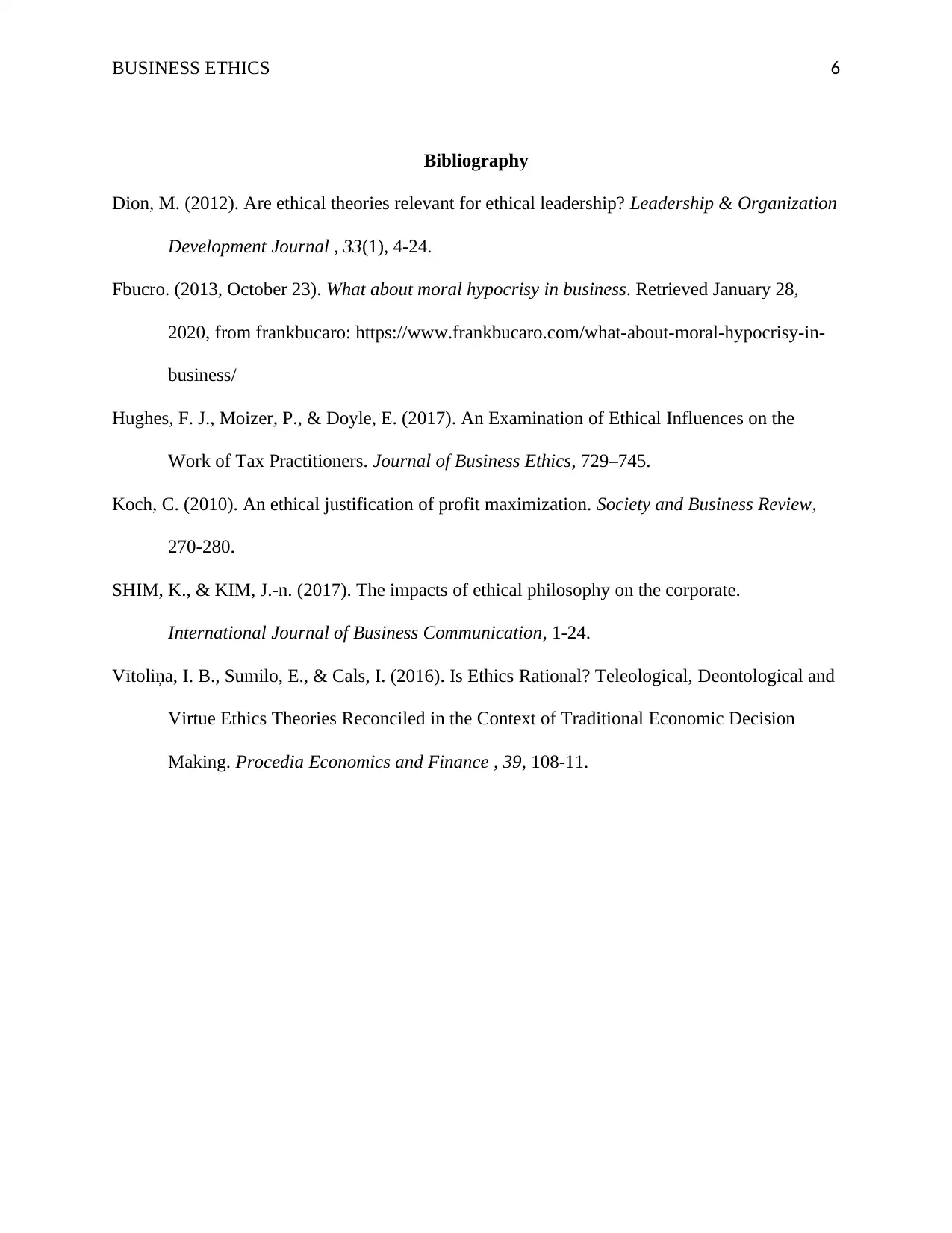
BUSINESS ETHICS 6
Bibliography
Dion, M. (2012). Are ethical theories relevant for ethical leadership? Leadership & Organization
Development Journal , 33(1), 4-24.
Fbucro. (2013, October 23). What about moral hypocrisy in business. Retrieved January 28,
2020, from frankbucaro: https://www.frankbucaro.com/what-about-moral-hypocrisy-in-
business/
Hughes, F. J., Moizer, P., & Doyle, E. (2017). An Examination of Ethical Influences on the
Work of Tax Practitioners. Journal of Business Ethics, 729–745.
Koch, C. (2010). An ethical justification of profit maximization. Society and Business Review,
270-280.
SHIM, K., & KIM, J.-n. (2017). The impacts of ethical philosophy on the corporate.
International Journal of Business Communication, 1-24.
Vītoliņa, I. B., Sumilo, E., & Cals, I. (2016). Is Ethics Rational? Teleological, Deontological and
Virtue Ethics Theories Reconciled in the Context of Traditional Economic Decision
Making. Procedia Economics and Finance , 39, 108-11.
Bibliography
Dion, M. (2012). Are ethical theories relevant for ethical leadership? Leadership & Organization
Development Journal , 33(1), 4-24.
Fbucro. (2013, October 23). What about moral hypocrisy in business. Retrieved January 28,
2020, from frankbucaro: https://www.frankbucaro.com/what-about-moral-hypocrisy-in-
business/
Hughes, F. J., Moizer, P., & Doyle, E. (2017). An Examination of Ethical Influences on the
Work of Tax Practitioners. Journal of Business Ethics, 729–745.
Koch, C. (2010). An ethical justification of profit maximization. Society and Business Review,
270-280.
SHIM, K., & KIM, J.-n. (2017). The impacts of ethical philosophy on the corporate.
International Journal of Business Communication, 1-24.
Vītoliņa, I. B., Sumilo, E., & Cals, I. (2016). Is Ethics Rational? Teleological, Deontological and
Virtue Ethics Theories Reconciled in the Context of Traditional Economic Decision
Making. Procedia Economics and Finance , 39, 108-11.
⊘ This is a preview!⊘
Do you want full access?
Subscribe today to unlock all pages.

Trusted by 1+ million students worldwide
1 out of 6
Related Documents
Your All-in-One AI-Powered Toolkit for Academic Success.
+13062052269
info@desklib.com
Available 24*7 on WhatsApp / Email
![[object Object]](/_next/static/media/star-bottom.7253800d.svg)
Unlock your academic potential
Copyright © 2020–2026 A2Z Services. All Rights Reserved. Developed and managed by ZUCOL.





